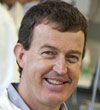 A new treatment for ‘superbugs' could be developed in Australia after a University of Queensland researcher received $5 million in funding to modify an existing antibiotic.
A new treatment for ‘superbugs' could be developed in Australia after a University of Queensland researcher received $5 million in funding to modify an existing antibiotic.
Professor Matthew Cooper (pictured left), from UQ's Institute for Molecular Bioscience (IMB), will use the Seeding Drug Discovery Award from the UK's Wellcome Trust to chemically alter the structure of vancomycin.
“Vancomycin and similar antibiotics were traditionally only used as a last-ditch treatment against bacterial infections, when all else had failed,” Professor Cooper said.
“But with bacteria becoming resistant to other treatments, these ‘drugs of last resort' are now in common use,” he said.
“However, many bacteria are now resistant to even these treatments. In fact, they're multi-resistant, with genes that enable them to survive the administration of several different types of antibiotics.
“These bacteria are known as ‘superbugs' and they're an increasing problem in communities and hospital wards around the world.”
In 2010, infectious diseases killed more people than cancer, according to figures from the World Health Organisation's Global Health Observatory Database.
While deaths are rising, the number of new antibiotics to treat these infections has declined to a quarter of those launched in the 1980s.
“If new treatments aren't developed, there is a real danger that diseases, which are easily treated now, will prove fatal in the future, and the world will regress to a situation akin to the pre-antibiotics era, when more than half of all deaths were from bacterial infection,” Professor Cooper said.
Professor Cooper, along with Professor David Paterson from the UQ Centre for Clinical Research and Dr Jason Roberts from the Royal Brisbane Hospital, will modify vancomycin into a new drug that weakens the structures in bacteria that cause resistance.
“Early laboratory tests on the test compounds have been very promising and with this support from the Wellcome Trust we hope to identify lead compounds to take forward into preclinical testing,” said Professor Cooper, who performed the original research at the University of Cambridge in collaboration with a UK-based biotechnology company.
In a recent commentary in top scientific journal, Nature, Professor Cooper called for governments to enact legislation to make it more attractive for companies to develop antibiotics, to help overcome the problem of resistance.
“Antibiotic resistance is a global health crisis. It requires global action before one of the most valuable discoveries of the 20th century is lost to the 21st century,” he said.
Media contacts: Professor Matt Cooper – 07 3346 2044 or IMB Communications – 07 3346 2134 or 0418 575 247
The Wellcome Trust is a global charitable foundation dedicated to achieving extraordinary improvements in human and animal health. It supports the brightest minds in biomedical research and the medical humanities. The Trust's breadth of support includes public engagement, education and the application of research to improve health. It is independent of both political and commercial interests.
www.wellcome.ac.uk
The Institute for Molecular Bioscience is one of Australia's leading research institutes. The major focus of IMB research is to understand the information contained in the genes, proteins and small molecules of animals and plants, and thereby to improve human health through the development of new pharmaceuticals, therapies and diagnostics. www.imb.uq.edu.au
Professor Cooper joined the IMB in 2009 after receiving a $4 million Australia Fellowship to conduct research into novel antibiotics to combat drug-resistant pathogens. He is an internationally recognised expert in the field of diagnostic device and biosensor development. http://cooper.imb.edu.au



